Those who deck themselves in Hokie hues know that Hokie Spirit runs deep, and perhaps nowhere does one find this fact more pronounced than in the numerous Virginia Tech alumni and students who dedicate themselves to helping the world. For many Hokies, this means taking their service to the professional level, using the skills and spirit they learned on campus to serve others across the globe through careers built around humanitarian efforts. Regardless of what form the service takes, alumni and students are making good on their commitment to serve, instilled throughout their years at Virginia Tech.
|
|
|
|
|
|
|
|
|
NiceBuy.org:
Funding philanthropy,
one purchase at a time
|
|
|
|
|
|
|
|
|
|
|
|
Though Joe Casola, a triple major in chemistry, math, and biochemistry, and Kevin Eberling, a finance major, are still Virginia Tech seniors, they've managed to find the time between classes to establish NiceBuy.org, a nonprofit website funded by affiliate-link commissions with retailers ranging from Walmart to Amazon.com.
Here's how the site works, according to Eberling: "Users go to NiceBuy.org and click on a retailer link before shopping online; after clicking on the link, the computer tells the retailer that the user was referred by NiceBuy.org." When the user makes a purchase, a percentage of the profits go to NiceBuy. It's the same system used by for-profit websites. The only difference is that the money raised by NiceBuy funds charitable causes.
|
|
|
|
|
|
|
|
|
|
|
|
|
|
|
Joe Casola (left) and Kevin Eberling, founders of Nicebuy.org
|
|
|
|
|
|
|
|
|
|
|
|
|
|
|
Currently, proceeds from the site are divided between Green Empowerment, an organization that helps poor villages in developing countries build sustainable infrastructure to enable development and access to health care, education, and economic growth, and AsoFénix, a nongovernmental organization in Nicaragua. There, the money goes to such projects as installing electricity for five schools and five health centers, installing irrigation pumps, and establishing electrical grids to reach 300 homes.
NiceBuy.org didn't come to fruition overnight. Both Casola and Eberling admit that it took a lot of groundwork to get the site up and running; Eberling says the two often worked 60 hours a week during the development and design phase. And maintaining the site while still attending school has been a challenge, they admit.
"In the beginning of the year, before our launch when we were still working on the website design and the model, it was very difficult to juggle everything. Since the website design was finished, I've been able to put more time back into my course work," says Casola.
"Some weeks I feel like I should have done more school work and other weeks I feel like I should have done more NiceBuy development. On the other hand, all of the help we've been getting from our new team members has been amazing," adds Eberling, who stresses a partnership with the Virginia Tech chapter of the Public Relations Student Society of America as one form of assistance the organization has received, in addition to two computer science majors who've lent their skills to the project.
Though both students intend to pursue other endeavors after graduation--Casola is interested in intellectual-property law, and Eberling leans toward the corporate-finance sector--both say they intend to continue their work with NiceBuy. "As long as it is continuing to help people, I see myself involved," says Casola.
|
|
|
|
|
|
|
|
|
Project Esperanza:
Providing hope
to homeless children
|
|
|
|
|
|
|
|
|
|
|
|
When Caitlin McHale (interdisciplinary studies '06) arrived in the Dominican Republic as a Virginia Tech freshman, she saw a need. She visited the country through an organization called Orphanage Outreach, which leads volunteer trips to orphanages. "After two trips, we formed Project Esperanza," she says. The organization's name has a double meaning: first, it is the name of the town in which the nonprofit has its roots; second, it is the Spanish word for hope.
Now based in Puerta Plata, Project Esperanza serves up to 150 Haitian boys and young men. These children go to the Dominican Republic in search of work but often find themselves living in poverty without access to education. Project Esperanza, as its name suggests, gives them hope, providing them with food, shelter, and an education, as well as helping them to find jobs and support themselves financially when they are ready.
|
|
|
|
|
|
|
|
|
|
|
|
|
|
|
Inspired by a trip to the Dominican Republic as a Virginia Tech student, alumna Caitlin McHale (center) now heads Project Esperanza, which provides food, shelter, and educational opportunities to Haitian boys and young men living in the Dominican Republic.
|
|
|
|
|
|
|
|
|
|
|
|
|
|
|
"I always compare leading Project Esperanza to a type of motherhood because I have felt like a mother with a child all along," McHale says. "I feel like until now we have been in the infant and toddler stages, perhaps entering into young childhood."
She now spends most of her time in the Dominican Republic, where she lives with her husband and son. For McHale, the Dominican Republic has become more and more like home. "I would love to have a little house here with my family, a garden, some chickens and other animals, a basketball hoop, some nice shady trees, and fruit trees."
Right now, Project Esperanza is integrated into her personal life. In 2008, McHale lived at the boys' home, where she says she was just "an extra bed and an extra plate of rice and beans," but she says that as her family life has grown, the need for a separation has grown as well. She hopes one day to travel more to the U.S. to promote the organization's activities in the states, including a learning center designed to help children and families in a New River Valley trailer park.
Watching the progress of the boys in the home and school in the Dominican Republic, McHale says, has been the most rewarding aspect of the project. "Some of the boys have been very thankful and have let me know that they believe several of them would be in jail or dead if it weren't for Project Esperanza.
"Speaking with them and considering who to place and where to place them has been very rewarding--being able to look back at where they were a few years ago and see how they have matured and how they really do have hope for their future and a good ethic mindset along with a strong understanding of how to live with others."
|
|
|
|
|
|
|
|
|
Global Goods Partners:
Promoting women-led
development
|
|
|
|
|
|
|
|
|
|
|
|
Cecilia Foxworthy (clothing and textiles '02) directs operations and marketing for Global Goods Partners (GGP), where she helps create artisan jobs and provides access to a global market for women from more than 22 countries. "My work gives women in developing countries the opportunity to lift themselves out of poverty and provide their families with better options," she says.
Established in 2006, GGP provides market access to women in developing countries, allowing them to use artisan skills such as sewing, knitting, and jewelry making to help support themselves. It then supplies commercial avenues for selling these goods, including its website, www.globalgoodspartners.org, where customers can purchase anything from yoga bags and children's toys to beaded bangles and hand-embroidered scarves. All of the goods are fair trade, meaning that producers receive a fair living wage, operate in a democratic workplace, and are provided clean and safe work environments.
|
|
|
|
|
|
|
|
|
|
|
|
|
|
|
Cecilia Foxworthy (right) and Catherine Shimony, a GGP co-founder, search near Lake Atitlan in Guatemala for new artisan partners for GGP.
|
|
|
|
|
|
|
|
|
|
|
|
|
|
|
"While charity and emergency relief are very important components of international aid, my main focus is economic development in order to help create a sustainable and self-sufficient society within the marginalized regions in which I work," Foxworthy says.
"The women GGP works with continually express the desire to have control over their own fates and to be able to contribute to their families economically. The market access and technical assistance GGP provides to them is not only an income-generation opportunity, but is also a means to women's empowerment and community improvement."
Foxworthy credits her experiences at the university with preparing her to do the work: "The degree program I pursued at Virginia Tech gave me the flexibility to carve my own path."
Casola's words echo those of Foxworthy about how Virginia Tech prepares its students for helping others through humanitarian organizations, whether this means working for an existing nonprofit or starting a nonprofit from scratch. "From Relay for Life to the alternative-break program to the Big Event, I've been so impressed by the level of commitment this campus shows toward helping others. Virginia Tech has been a great institution of learning for me and, more importantly, a great community for me to learn from."
For Casola, Eberling, Foxworthy, McHale, and numerous other Hokies, Ut Prosim is more than a motto--it is their life's work.
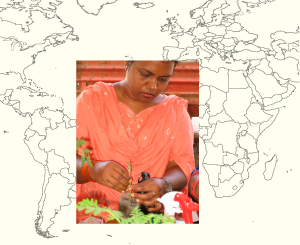 |
 by MIRIAM RICH
by MIRIAM RICH
|
The Office of International Research, Education, and Development (OIRED) is an unusual unit at a university. The office leverages the assets of a large, land-grant university, in particular its knowledgeable faculty, to improve life in developing countries.The arrangement is win-win: the large agencies that provide the funding, such as USAID, get the expertise of Virginia Tech professors in helping them solve development problems, and the professors get opportunities to conduct research and share the results, both here and abroad.
A growing portion of OIRED projects focuses on post-conflict countries, such as Southern Sudan, Nepal, Haiti, and Liberia. "We're trying to construct anew or re-construct what the conflict has wrought," says Mike Bertelsen, associate director of OIRED and associate dean of the College of Agriculture and Life Sciences.
OIRED's current portfolio of $64 million allows it to carry out an array of projects across the globe.
|
|
|
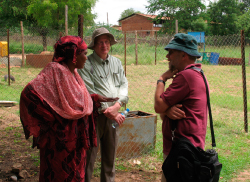 |
|
Recreating agriculture in Southern Sudan |
|
Faculty members are working with two regional universities in Southern Sudan to develop new programs in agriculture and natural resource management. Since the region recently emerged from nearly a half century of civil war that killed or displaced millions and destroyed nearly all educational infrastructure, it desperately needs an educational structure in place to train the next generation of agricultural teachers, extensionists, and researchers. "The challenges are enormous, but the natural resources are there. It's an incredibly rich area, and the people we've worked with are highly motivated. They really want to develop their country and put it on the road to prosperity," says Bertelsen, principal investigator on the project. |
|
|
|
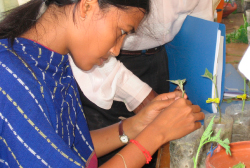 |
|
Saving the eggplant crop in Bangladesh |
|
In rural Bangladesh, eggplant is a dietary staple and an important income-earning crop. When a disease in the soil destroyed the eggplant crop several years ago, the results were devastating. Through an OIRED-managed project, women throughout the affected area have been learning to graft a high-yielding variety of eggplant onto a variety that is resistant to the soil-borne scourge of bacterial wilt. The grafting provides income for the women, who can now purchase milk for their children and send them to school. Their work allows farmers to continue growing eggplant. This project is one of many under the Integrated Pest Management Collaborative Research Support Program. |
|
|
|
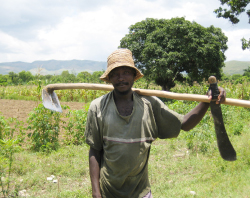 |
|
Developing conservation agriculture in Haiti |
|
Everyday challenges are enormous in Haiti's central plateau. Severe soil degradation, high erosion rates, and soils with declining water-holding capacity make growing crops difficult, producing the lowest yields in the western hemisphere. Faculty members from Virginia Tech are working with experts at Zanmi Agrikol (affiliated with Partners in Health, the Paul Farmer organization), Caritas Hinche (a Catholic nongovernmental agency), the State University of Haiti, and the Haitian Ministry of Agriculture to develop conservation agriculture in the area. According to Theo Dillaha, director of the Sustainable Agriculture and Natural Resource Management Collaborative Research Support Program (SANREM CRSP), which oversees the project, "Conservation agriculture is farming that does three things: it minimizes tillage of the soil, maintains a continuous organic cover year-round, and includes crop rotations." Such practices restore soil fertility and reduce erosion, and agriculture becomes more resistant to climate change, thereby improving one facet of life in the central plateau. |
|
|
|
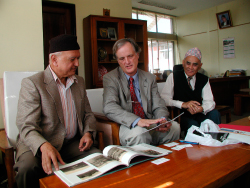 |
|
Creating conservation professionals in Nepal |
|
In Nepal, forests harbor unique biodiversity and play a vital role in the economy of rural communities. OIRED, along with Yale University and Principia College, is creating the Memorial Center of Excellence at the country's Institute of Forestry that will develop the next generation of conservation professionals in the resource-rich country. The center will serve as a memorial to 24 national and international conservation experts who were killed in a helicopter crash in Nepal in 2006. As the birthplace of community forestry--the practice of organizing the use of forest resources around the needs of a community--Nepal is an appropriate site for this project. "Students are learning to work in community and not only be better stewards of the land, but also be socially inclusive, a critical skill in highly stratified Nepali society," says Tom Hammett, professor of forestry and partnership director for the project. |
|
|
|
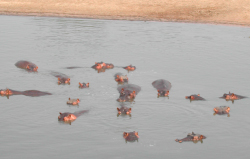 |
|
Helping hippos in Zambia |
|
Drought, deforestation, and farming are threatening the deep-water habitat of hippos in Zambia. Under a SANREM project, Conrad Heatwole, a Virginia Tech professor of biological systems engineering, is studying how agriculture, commerce, and tourism affect water supply and, in turn, wildlife in Zambia's South Luangwa National Park. The techniques Heatwole is using are also being applied in the Andean region of Bolivia and Ecuador to combat poor practices in farming, grazing, and forestry. On both continents, the goal is to teach farmers how to make a living without threatening biodiversity and natural resources. |
|
|
|
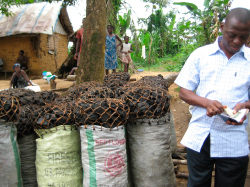 |
|
Re-establishing forest communities in Liberia |
|
A 14-year civil war in Liberia threatened to eradicate one of its major resources: the largest contiguous forest block in West Africa. The forest is a critical biodiversity hotspot that is integral to the livelihood of local people. Through a Virginia Tech-led program, Liberian government officials are learning to balance the needs of forest conservation, community forestry, and commercial forestry.
Through these projects and others, OIRED is changing lives in developing countries worldwide.
|
|
|
|
 |
|
|
| MIRIAM RICH is communications director for the Office of International Research, Education, and Development. |
|

